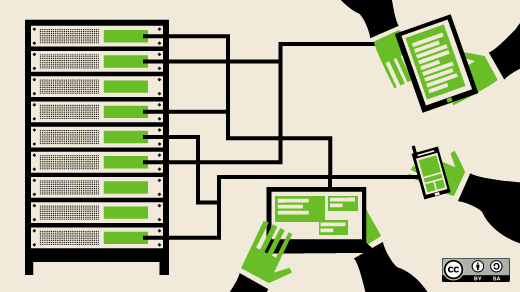mirror of
https://github.com/LCTT/TranslateProject.git
synced 2025-01-13 22:30:37 +08:00
47 lines
5.4 KiB
Markdown
47 lines
5.4 KiB
Markdown
Confessions of a recovering Perl hacker
|
|
======
|
|
|
|

|
|
|
|
My name's MikeCamel, and I'm a Perl hacker.
|
|
|
|
There, I've said it. That's the first step.
|
|
|
|
My handle on IRC, Twitter and pretty much everywhere else in the world is "MikeCamel." This is because, back in the day, when there were no chat apps—no apps at all, in fact—I was in a technical "chatroom" and the name "Mike" had been taken. I looked around, and the first thing I noticed on my desk was the [Camel Book][1], the O'Reilly Perl Bible.
|
|
|
|
I have the second edition now, but this was the first edition. Yesterday, I happened to pick up the second edition, the really thick one, to show someone on a video conference call, and it had a thin layer of dust on it. I was a little bit ashamed, but a little bit relieved as well.
|
|
|
|
For years, I was a sysadmin. Just bits and pieces, from time to time. Nothing serious, you understand—mainly my systems, my friends' systems. Sometimes I'd admin systems owned by other people—even at work. I always had it under control, and I was always able to step away. There were whole weeks—well days—when I didn't administer a system at all. With the exception of remote systems, which felt different, somehow less serious.
|
|
|
|
What pushed it over the edge, on reflection, was the Perl. This was the '90s—the 1990s, just to be clear—when Perl was young, and free, and didn't even pretend to be object-oriented. We all know it still isn't, but those youngsters—they like to pretend, and we old lags, well, we play along.
|
|
|
|
The thing about Perl is that it just starts small, with a regexp here, a text-file line counter there. Nothing that couldn't have been managed quite easily in Bash or Sed or Awk. But once you've written a couple of scripts, you're in—there's no going back. Long-term Perl users remember how we started, and we see the newbs going the same way.
|
|
|
|
I taught myself Perl in order to collate static web pages from five disparate FoxPro databases. I did it by starting at the beginning of the Camel Book and reading as much of it as I could before my brain started to hurt, then picking up a few pages back and carrying on. And then writing some Perl, which always failed, mainly because of lack of semicolons to start with, and then because I didn't really understand much of what I was doing. But I kept with it until I wasn't just writing scripts to collate databases, but scripts to load data into a single database and using CGI to serve pages in real time. My wife knew, and some of my colleagues knew, but I don't think they fully understood how deep I was in.
|
|
|
|
You know that Perl has you when you start looking for admin tasks to automate with it. Tasks that don't need automating and that would be much, much faster if you performed them by hand. When you start scouring the web for three- or four-character commands that, when executed, alphabetise, spell-check, and decrypt three separate files in parallel and output them to STDERR, ROT13ed.
|
|
|
|
I was lucky: I escaped in time. I always insisted on commenting my Perl. I never got to the very end of the Camel Book. Not in one reading, anyway. I never experimented with the darker side-effects; three or four separate operations per line was always enough for me. Over time, as my responsibilities moved more to programming, I cut back on the sysadmin tasks. Of course, that didn't stop the Perl use completely—it's amazing how often you can find an excuse to automate a task and how often Perl is the answer. But it reduced my Perl to manageable levels, levels that didn't affect my day-to-day functioning.
|
|
|
|
I'd like to pretend that I've stopped, but you never really give up on Perl, and it never gives up on you.
|
|
|
|
I'd like to pretend that I've stopped, but you never really give up on Perl, and it never gives up on you. My Camel Book (2nd ed.) is still around, even if it's a little dusty. I always check that the core modules are installed on any systems I run. And about five months ago, I found that my 10-year-old daughter had some mathematics homework that was susceptible to brute-forcing. Just a few lines. A couple of loops. No more than that. Nothing that I didn't feel went out of scope.
|
|
|
|
I'd like to pretend that I've stopped, but you never really give up on Perl, and it never gives up on you. My Camel Book (2nd ed.) is still around, even if it's a little dusty. I always check that the core modules are installed on any systems I run. And about five months ago, I found that my 10-year-old daughter had some mathematics homework that was susceptible to brute-forcing. Just a few lines. A couple of loops. No more than that. Nothing that I didn't feel went out of scope.
|
|
|
|
I discovered after she handed in the results that it hadn't produced the correct results, but I didn't mind. It was tight, it was elegant, it was beautiful. It was Perl. My Perl.
|
|
|
|
--------------------------------------------------------------------------------
|
|
|
|
via: https://opensource.com/article/18/7/confessions-recovering-perl-hacker
|
|
|
|
作者:[Mike Bursell][a]
|
|
选题:[lujun9972](https://github.com/lujun9972)
|
|
译者:[译者ID](https://github.com/译者ID)
|
|
校对:[校对者ID](https://github.com/校对者ID)
|
|
|
|
本文由 [LCTT](https://github.com/LCTT/TranslateProject) 原创编译,[Linux中国](https://linux.cn/) 荣誉推出
|
|
|
|
[a]:https://opensource.com/users/mikecamel
|
|
[1]:https://en.wikipedia.org/wiki/Programming_Perl
|